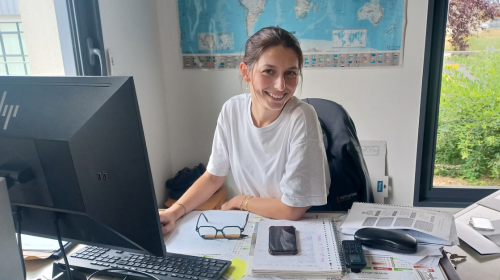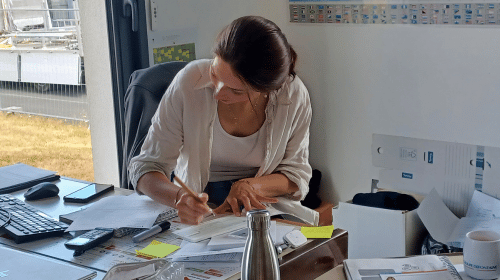Axelle Vincent, from an apprenticeship to full-time employment at Defontaine SAS

What is your educational background?
After earning my ES Baccalauréat, I did a two-year University Bachelor of Technology (BUT) in Legal Careers, during which I discovered human resources. I then pursued a Bachelor’s degree in Human Resources while working in a company through a work-study program. After that, I completed a Master’s degree in Human Resources Engineering at UCO (Université Catholique de l’Ouest) in Angers, also through a work-study program at Defontaine SAS, where I focused on recruitment and training assignments.
How long have you been in a work-study program with the Defontaine Group? When does your training end, and what comes next?
I joined the company in September 2023 on an apprenticeship contract that will end in August 2025. I’ve been offered a permanent position (CDI) in the HR department as a Training Officer.
(I’m really happy to be continuing this journey!)
What are your daily responsibilities within the HR department?
When I first joined, I focused on recruitment, managing temporary workers on site as well as the apprenticeship campaign. As I gained more autonomy, I began conducting interviews myself, particularly for production operator positions.
Currently, I’m working on the training program developed by Defontaine SAS.
How did your integration into the company and the HR department go?
I was supervised by two mentors, one for recruitment and the other for training. So I had two very different roles, which meant that I didn’t get lost in my apprenticeship and that I had personalised support for my tasks.
The HR team was very welcoming; I was quickly integrated thanks to the positive atmosphere, the supportive approach to my tasks, and the trust I was given by being assigned additional responsibilities beyond my main duties.
What have you learnt from your two-year apprenticeship with Defontaine SAS?
I’d say that it’s above all the perspective I’ve gained and the maturity I’ve acquired. I’ve acquired a lot of structure at Defontaine SAS, thanks in particular to the variety of my tasks. My work-study placement here has given me a better understanding of training and recruitment strategy, as well as human resources strategy in general, combining the human side with the resources side. All this has enabled me to develop very well within the company.
Why did you choose a work-study program over a traditional academic path? How has this experience been beneficial to you?
Human resources exist in nearly every industry. A work-study program allows you to understand the company’s business sector as a whole and to directly connect what you learn in school with real-world application.
One of the great advantages at Defontaine SAS is that the production area is located right next to our offices, which creates strong proximity with both employees and managers.
Thanks to the work-study format, I’ve been able to immediately apply in the company what I learn in class, across all areas of HR, especially in safety and labor relations.
To truly carry out an HR role, you need direct contact with staff; otherwise, the job loses its meaning.
Were there any aspects of your apprenticeship that you liked less?
I felt frustrated sometimes not being able to be present for all the important moments the company experiences due to my time away at the training center. Occasionally, key events happen within the HR department that I cannot attend. Naturally, I need to catch up on those things afterward. Fortunately, I always have meetings with my mentors when I return, so they can fill me in on what I missed.
What advice would you give to future work-study students at Defontaine SAS?
The company’s watchwords are kindness and support. The people appointed as mentors or apprenticeship masters are there to pass on their know-how and provide us with the best possible support so that we succeed in our training, but also to help us integrate into the world of work. They provide us with the key skills we need to become very good professionals in the future, whatever department we find ourselves in. So I would say to future work-study students: don’t hesitate. You need to take advantage of the opportunity to learn about new practices and ways of working at the training centre, and apply them to the company.
What type of profiles do you think the work-study program is suited for?
I think that as soon as you have a professional vocation, feel capable of doing it and know what you want to do, then work- study is a real opportunity. If you don’t like what you’re doing, you won’t be invested in your work and you’ll be much less motivated. Once you’ve found your path, an apprenticeship gives you the chance to be valued and to have your work recognised. It gives us the self-confidence to enter the world of work tomorrow.
You were talking about finding your way. How did you find your way into human resources?
I think it was the very human and social side that I liked about human resources. It started in my last two years of high school (Première and Terminale), as I really enjoyed sociology. I didn’t go straight into HR after the baccalauréat because I was advised to go into business management. It was a very strategic area, so I didn’t really get into it, I was really looking for the human side, the proximity. I wanted to feel useful and that it made sense for me. Human resources then became an obvious choice: I could bring my touch to employees through my job, and particularly through training, which I think is a great way of feeling useful and developing people.



